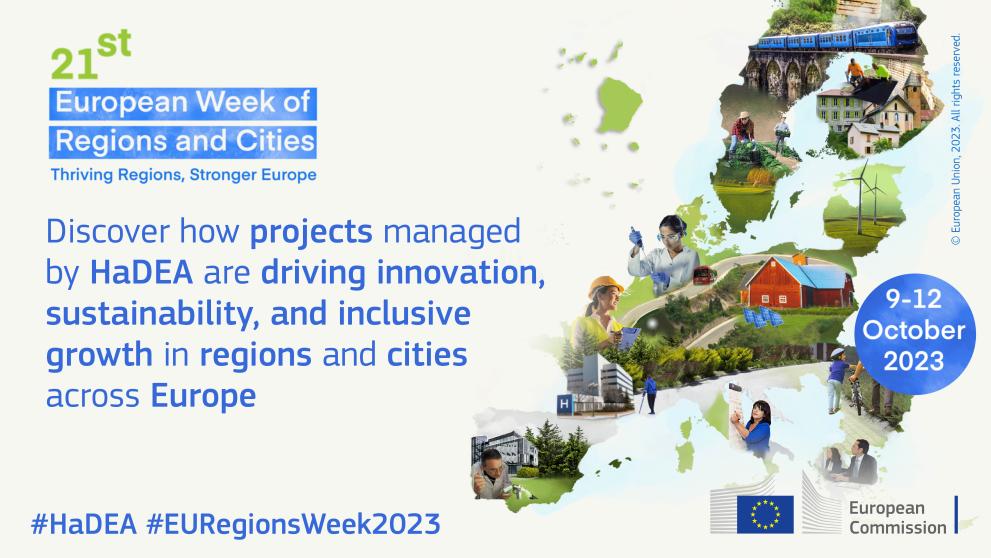
The European Week of Regions and Cities is an annual event during which cities and regions showcase their capacity to create growth and jobs, implement European Union cohesion policy, and prove the importance of the local and regional level for good European governance.
EURegionsWeek 2023, takes place in Brussels, from 9 to 12 October, and offers the opportunity to debate on the future of regional and urban policy.
Discover how some of HaDEA-managed Horizon Europe projects are contributing to the development of regions and cities: RIS4Danu, CommuniCity, H4C Europe and H4C ECoP and AMBIEANCE.
RIS4Danu proposes a series of concerted actions to elaborate strategic business development plans for the re-opening of 21 disused industrial sites in the Danube macro-region, an area that stretches from the Black Forest to the Black Sea. Its main objective is to apply evidence-based Smart Specialisation (S3) approach to support place-based innovation for green, digital and inclusive transitions in regions along the Danube River. This project ties in with current debates and requests to combine smart specialisation with considerations of socio-ecological challenges such as climate change, environmental issues and growing social and territorial inequality: Smart Specialisation Strategies for Sustainable and Inclusive Growth (S4+).
CommuniCity will conduct numerous innovation pilots in local communities (urban, peri-urban and rural) with the aim of empowering the hard-to-reach and marginalised communities. The project will build on recently awarded European as well as national place-based and locally-driven innovation programmes, methods, living labs and platforms. Following the success of its first open call, the project launched its second open call on 12 September. Stakeholders are called into action to co-create innovative, digitally inclusive, sustainable solutions to tackle social, technological, economic, and urban challenges. These efforts are geared towards meeting the needs of marginalised communities residing in European cities. The second open call mimics and expands the first open call, during which the project’s three partnering cities - Amsterdam, Helsinki, and Porto – awarded 13 innovative ideas (pilots). This time, the initiative expanded to four additional cities - Aarhus, Breda, Prague, and Tallinn - which will build upon previous knowledge to address additional challenges.
Two consortia, H4C Europe and H4C ECoP, each bringing unique strengths and expertise to the table, have joined forces with a shared mission: to develop a European Community of Practice platform and generate knowledge on circularity and industrial symbiosis over the next four years. This collaborative effort has given rise to the Hubs4Circularity Community of Practice, which is continuously evolving to catalyze regional industry-society partnerships. Its main objective is to drive progress towards circularity and carbon neutrality in resource use (feeds tock, energy and water) in a profitable way within local context. The Community of Practice is a network of partners from industry, regions, and cities, set up under Horizon Europe. Its additional purpose is to facilitate building, scaling up, and potentially replicating industrial and industrial-urban symbiotic technological systems and circular economy.
The H4C Europe and H4C ECoP consortia are also collaborating with the H4C platform participants at developing a set of key performance indicators that will facilitate creation, development, and monitoring of symbiotic industrial ecosystems and beyond. The respective project activities will also define business models and promote funding and finance opportunities to boost industrial and industrial-urban symbiosis, and circularity.
By applying a circularity-by-design approach, AMBIANCE aims to develop new and advanced bio-based products, characterised by a high or total bio-based material content for urban outdoor applications through Innovative characterisation, digital technologies and circular approaches. Such approach will be coupled to the optimisation of the mechanical properties for particular applications, e.g. durability for outdoors urban furniture or sports and leisure products, taking into consideration the whole lifecycle. AMBIANCE will produce and showcase bio-based artificial turf, 3D-printed fully-recyclable benches and decorative construction bricks and panels. The results can be experienced in public by the end of the project in at least two pilots deployed in EU cities – Pontevedra (ES) and Stockholm (SE), which have committed their support to deploy the AMBIANCE urban bio-products in the city ecosystem for long-length demonstration activities.
Details
- Publication date
- 9 October 2023
- Author
- European Health and Digital Executive Agency
- Programme Sector
- Industry
- Programme
- Horizon Europe Cluster 4: Industry
- Tags
- EUFunded
- Event
- Innovation
